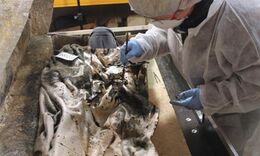UnNews:French corpse arrested for wearing burqa
| Every time you think, you weaken the nation —Moe Howard | ✪ | UnNews | ✪ | Saturday, February 14, 2026, 11:06:59 (UTC) |
| French corpse arrested for wearing burqa | 
|
3 June 2015
RENNES, France -- French police have arrested a French noblewoman, Louise de Quengo, for wearing a burqa in violation of a 2010 French law. Mme. de Quengo, 350, was a well-preserved corpse in a burial grave.
France bans the burqa, a piece of headgear that reaches the feet, worn by Muslim women on construction sites and to suicide bombings, due to the popularity of the French National Front, and not due to the growing anti-Islam sentiment in France. Legislators had looked into using that excuse and apparently it's illegal. The law was passed by the French Court of Human Rights, based in Strasbourg, and upheld by the European Court of Human Rights, which also happens to be situated in Strasbourg and share caterers, receptionists, and legislators.
On the arrest, Detective Inspector Jacques Clouseau commented, "Mrs. Louise de Quengo has been taken into custody under ze 2010 Facial Covering Ban as ze suspect was found wearing a burger." Burgers are also banned as alien to French culture, though the McDonald's outlets that pepper the country serve something remarkably similar, under a suitably French name.
Mme. de Quengo is expected to wear the same burqa to her trial. Prosecutors object to this, as doing so would make the embarrassing point that the law preserving French culture bans clothing that may have been a common part of French culture during the 17th century. This is currently just a theory among historians due to the lack of 17th Century corpses found still wearing clothes. However, for Mme. de Quengo to appear in court without the burqa would violate other French laws, pertaining to decency.
On the contrary, historian Gérard Paté claims, "It is quite possible zat zis lady was an illegal immigrant. During ze 17th Century, France was subjected to an invasion, crossing ze Mediterranean in large open barges. Many French noblemen married them in a French fashion craze at ze time." So the burqa may not have been a common piece of clothing in France at all.
Once the corpse has been cleaned up and is declared fit for museum exhibition, it will stand trial in Rennes Communal Court, where it faces up to 10 years in prison. France's right wing decried the leniency of this penalty, noting that Mme. de Quengo had violated French law for centuries. Some suggested cremation would be more sensible for a corpse that prison would be "too good for". In contrast, President Francois Hollande suggested that the corpse cound remain in the museum display under "house arrest" with the addition of an ankle bracelet.
Sources[edit]
- "Fully dressed and preserved 350-year-old corpse of French noblewoman found". The Guardian, June 03, 2015
- "France's burqa ban upheld by human rights court". The Guardian, July 01, 2015
